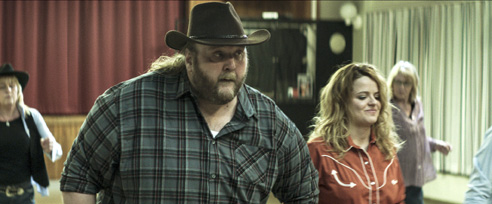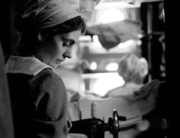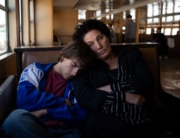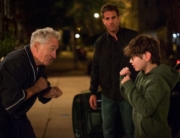Early on in the year may be as good a time as any to look back at 2015, before the number of films begins to snowball and as the awards season slowly winds down. What has been overlooked? What made the festival rounds but is conspicuously missing from this year’s lineup, having perhaps gotten lost in the pipeline? What follows is a wish list to distributors and a reminder that though more films are available on various platforms as ever before, good work, especially if it’s not in English, has difficulty reaching an American audience.
Last year was the first time two narrative films stood out so far ahead of the typically strong documentaries at the Tribeca Film Festival. Both films had either a North American or world premiere at the festival, which is not coincidental. Tribeca has become a valuable gateway for emerging directors and a showcase for films that may have launched in Berlin or at the lesser-known Göteborg International Film Festival earlier in the winter; Cannes, Venice, and Toronto aren’t the only gatekeepers. Both films highlight the strength of Tribeca: the opportunity to experience a discovery that takes you by surprise (among nearly a hundred movies). Hopefully, these won’t remain a kept secret among festivalgoers.
Virgin Mountain has won a number of international awards, including three at Tribeca: best narrative feature, actor, and screenplay. Yet it still lacks a U.S. distributor. (True, it sounds like a very adult ride at Disneyland.) The original title is Fusi, named for the main character who undergoes a belated coming of age. The easiest way to describe the movie is as a contemporary variation of 1955’s Marty or the 2012 Danish film Teddy Bear, in which a hulking bodybuilder steps out of his dictatorial mother’s shadow, but Virgin nevertheless feels fresh because of its fully developed, though painfully timid and socially stymied, protagonist. Portrayed so specifically by Gunnar Jonsson, his performance is subtle enough that the camera, at close proximity, can practically read his thoughts.
At age 43, Fusi lives in an apartment with his hairdresser mom (dad is out of the picture). He stands more than six feet tall and weighs nearly 300 pounds. The camera emphasizes his size as he hunches over the breakfast table eating cereal and drinking a glass of milk. He keeps to himself at work—where he, an airport baggage handler, is harassed by his coworkers for his appearance—and at home, where he shuts himself off, building miniature World War II battlefields, a hobby he shares with a longtime friend. Fusi is not intrinsically an asocial loner, but he lives his life as though he’s trapped in amber as a 13-year-old, and it takes an outsider, his mom’s latest boyfriend, to stir the pot, giving Fusi a birthday gift certificate for country-western dance lessons. No eye rolling, please. Sidestepping clichés, the film resists a dance/music montage, nor does it follow a rigid romcom route. Fusi’s idiosyncrasies come off as more character defining than quirky.
The rest of the cast—the overprotective mother; her crude, boisterous boyfriend; the depressed woman Fusi cautiously pursues—may be the life of the party in comparison to him, but they don’t steal the focus. Another director might have strung out the pathos, yet even when Fusi experiences a baby-step victory, he doesn’t quite break out into a smile. The director Dagur Kari leaves that for the audience.
Kari’s script adroitly balances sentimentality with an underlying melancholia and tartness (including a wince-inducing scene when Fusi is set up with a prostitute). The soundtrack’s playlist sums the movie up: heavy metal mixed with Dolly Parton. It’s as droll and button-down as many Scandinavian films that have recently made it stateside (A Pigeon Sat on a Branch Reflecting on Existence, for instance), but with a tighter narrative. Perhaps the success of another arrival, Rams, will open doors for more Icelandic fare.
From Costa Rica, Viaje is a remarkably sensuous, languid two-hander, and only the second film by Paz Fábrega. It shares a special place among the elite but welcoming subgenre of travel-romance. The most seductive of which builds suspense based on a will-they-or-won’t-they premise: Will a couple who has just met run off together into the sunset, or is this the last hurrah before both return to the routine. (Before Sunrise and Brad Pitt’s late-night rendezvousing with Tilda Swinton in The Curious Case of Benjamin Button are just two examples.)
Fábrega’s film has a loose but focused narrative, highlighted by the seeming spontaneity between the two leads: Pedro (Fernando Bolaños) and Lucia (Kattia Gonzále), both in the last years of their twenties. They meet at a booze-flowing costume party; he’s a bear, and no one can guess what she, wearing a gingham apron, is supposed to be. After spending the night sleeping off their hangover, they impulsively take off to a remote national park—a rainy, secluded Eden—where Pedro is a graduate student researcher.
Their hookup is inevitable; they get each other’s sense of humor as they goof off with all the time in the world, well, at least for a day or two. Steadily building tension, Fábrega knowingly delays the moment when they finally snog, and she uses the camera to explore the milieu, even once from a dog’s point of view. Shot in slightly overexposed black-and-white, the background is less defined than the couple in the foreground. Incredibly, the lead actors have never acted before; their convincing chemistry is disarming.
However, not all is without a festival afterlife. A few highlights from last year’s Toronto International Film Festival will be arriving in theaters this spring, including Juliette Binoche in an extreme case of motherly love, L’attesa (The Wait). Her steely performance adds to an impressive resumé of incisive and complicated (that’s putting it mildly) roles. Here her emotionally shaky character walks in the footsteps of Joan Crawford and Anna Magnani, while filmed in sumptuous widescreen Sicilian surroundings by first-time feature filmmaker Piero Messina. And veteran Russian filmmaker Alexander Sokurov celebrates Francofonia, his wet-kiss tribute to what he considers the bastion of Western civilization, the Louvre. The chiaroscuro-lit footage of the camera gliding through its galleries offers the best kind of armchair traveling.


















Leave A Comment